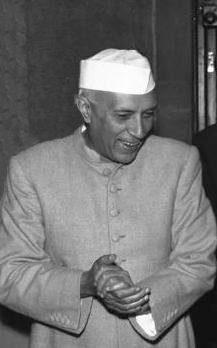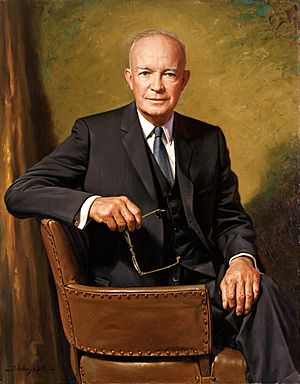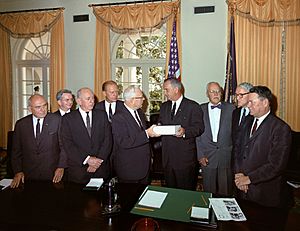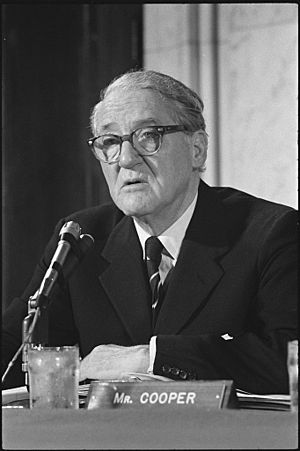John Sherman Cooper facts for kids
Quick facts for kids
John Sherman Cooper
|
|
|---|---|
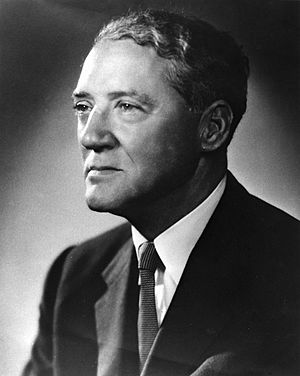
Official portrait of Cooper while serving
|
|
| 1st United States Ambassador to East Germany | |
| In office December 20, 1974 – September 28, 1976 |
|
| President | Gerald Ford |
| Preceded by | Brandon Grove (chargé d'affaires) |
| Succeeded by | David B. Bolen |
| United States Senator from Kentucky |
|
| In office November 7, 1956 – January 3, 1973 |
|
| Preceded by | Robert Humphreys |
| Succeeded by | Walter Dee Huddleston |
| In office November 5, 1952 – January 3, 1955 |
|
| Preceded by | Thomas R. Underwood |
| Succeeded by | Alben Barkley |
| In office November 6, 1946 – January 3, 1949 |
|
| Preceded by | William A. Stanfill |
| Succeeded by | Virgil Chapman |
| 5th United States Ambassador to India | |
| In office February 4, 1955 – April 9, 1956 |
|
| President | Dwight D. Eisenhower |
| Preceded by | George V. Allen |
| Succeeded by | Ellsworth Bunker |
| Member of the Kentucky House of Representatives from the 41st district |
|
| In office 1928–1930 |
|
| Preceded by | F. T. "Tom" Nichols |
| Succeeded by | William E. Randall |
| Personal details | |
| Born | August 23, 1901 Somerset, Kentucky, U.S. |
| Died | February 21, 1991 (aged 89) Washington, D.C., U.S. |
| Political party | Republican |
| Spouses |
Evelyn Pfaff
(m. 1944; div. 1947)Lorraine Rowan Shevlin
(m. 1955; died 1985) |
| Alma mater |
|
| Profession |
|
| Signature | |
| Military service | |
| Branch/service | United States Army |
| Years of service | 1942–1946 |
| Rank | Captain |
| Unit | 15th Corps, U.S. Third Army |
| Battles/wars |
|
| Awards | Bronze Star Medal |
John Sherman Cooper (born August 23, 1901 – died February 21, 1991) was an important American politician, judge, and diplomat from Kentucky. He served as a United States Senator for several terms. He was also the United States Ambassador to India from 1955 to 1956 and the United States Ambassador to East Germany from 1974 to 1976.
Cooper was the first Republican from Kentucky to be elected to the Senate more than once by popular vote. In both 1960 and 1966, he won by the largest margin ever for a Kentucky Senate candidate. He was known for being an independent thinker in politics.
Contents
Who Was John Sherman Cooper?
John Sherman Cooper had a long career in public service. He started in local government, then served in the military during World War II. After the war, he became a judge. He was elected to the U.S. Senate three times for partial terms, and then for two full terms.
He also served as an ambassador, helping to improve relationships between the U.S. and other countries. Cooper was a key figure in American politics during the mid-20th century.
Early Life and Education
John Sherman Cooper was born on August 23, 1901, in Somerset, Kentucky. He was the second of seven children. His family was well-known in the area and very active in local politics. Many of his relatives, including his father, were county judges.
As a young person, Cooper worked in different jobs, like delivering newspapers and in his father's coal mines. He went to public school from sixth grade onwards. At Somerset High School, he played basketball and football. He graduated second in his class in 1918.
After high school, Cooper attended Centre College in Kentucky. He played football there and was part of the "Praying Colonels" team, which was undefeated in 1918. He then transferred to Yale University in Connecticut.
At Yale, Cooper was very active in student life. He was the first person in Yale history to be captain of the basketball team for two years. He graduated from Yale in 1923 with a Bachelor of Arts degree.
He then went to Harvard Law School. However, he had to leave early because his father passed away and his family had lost most of their money. Cooper returned to Kentucky and became a lawyer in 1928. He spent the next 20 years helping his family, paying off debts, and making sure his six siblings could go to college.
Starting in Politics
In 1927, Cooper began his political career. He ran for a seat in the Kentucky House of Representatives as a Republican and won without anyone running against him. As a state representative, he often voted independently, even against his own party's governor on some issues.
In 1929, Cooper was elected county judge of Pulaski County. He served for eight years. He was known as "the poor man's judge" because he often helped people who were struggling during the Great Depression. He sometimes helped them find new homes or even gave them money. The hardships he saw affected him deeply, and he took a break for treatment.
From 1935 to 1946, Cooper was also on the board of trustees for the University of Kentucky. In 1939, he tried to become the Republican candidate for governor but did not win the primary election.
Serving in World War II
Even though he was 41 years old, Cooper joined the United States Army in 1942 during World War II. He chose to enlist as a private, even though he was offered an officer's rank. He later became an officer after attending Officer Candidate School.
He served in France, Luxembourg, and Germany. After the war ended, Cooper helped many displaced persons who had been forced to work as slaves by the Nazis. He also helped reorganize the courts in Bavaria, Germany, to remove Nazi officials. For this work, he received the Bronze Star Medal.
While he was still in the Army in Germany, Cooper was elected as a circuit judge in Kentucky in 1945. He returned home in February 1946 to take on this new role.
First Time in the Senate
In November 1946, Cooper resigned from his judgeship to run for a United States Senate seat. The seat became open when Senator Happy Chandler resigned. Cooper won the election by a large number of votes, which was a record for a Republican in Kentucky at that time. This was only the third time a Republican had been popularly elected to the Senate from Kentucky.
In the Senate, Cooper was known for being an independent Republican. He often voted based on what he thought was best for his constituents, even if it meant disagreeing with his own party. For example, he supported federal aid for education and helped create a bill for highway construction funds.
He also worked to help veterans and people displaced by the war. He supported civil rights and co-sponsored a bill to create the Medicare system, though it didn't pass at the time. In 1948, he ran for re-election but lost to a Democrat.
After his Senate term, President Harry S. Truman appointed Cooper as a delegate to the United Nations General Assembly. He also advised the Secretary of State during the creation of the North Atlantic Treaty Organization (NATO).
In 1952, Cooper was elected to the Senate again for another partial term. He continued his independent voting record. He was critical of attempts to allow illegal wiretap evidence in federal courts and supported protections against self-incrimination. He was the only Republican to oppose the Bricker Amendment, which would have limited the president's power to make treaties.
In 1954, Cooper ran for re-election again. He was very popular, but he lost to former Vice President Alben W. Barkley, who was 77 years old and a very beloved figure in Kentucky.
Ambassador to India
In 1955, President Dwight D. Eisenhower asked Cooper to become the United States Ambassador to India and Nepal. India had only recently become an independent nation and was very important in Asia. Relations between the U.S. and India were difficult at the time.
Cooper married Lorraine Rowan Shevlin on March 17, 1955, just before leaving for India. She was a well-known socialite who spoke several languages.
As ambassador, Cooper quickly became good friends with Indian Prime Minister Jawaharlal Nehru. Cooper worked hard to help U.S. officials understand India's desire to remain neutral and not pick sides between the West and the Communist countries. He also explained to the Indians that U.S. actions were for self-defense, not aggression.
Thanks to Cooper's efforts, relations between the U.S. and India greatly improved. He helped secure a large financial aid package for India, which was important for the country's development.
Back in the Senate
In 1956, Senator Barkley passed away. President Eisenhower personally asked Cooper to return from India and run for the open Senate seat. Cooper agreed and won the election.
Back in the Senate in 1957, Cooper joined the Senate Foreign Relations Committee. He was known as one of the most capable Republican senators. He helped create the National Defense Education Act and the Appalachian Regional Development Act, which aimed to help poor areas in the Appalachian Mountains.
In 1960, Cooper was re-elected for his first full six-year term. He won by a record-breaking margin of votes. Shortly after, President John F. Kennedy asked Cooper to go on a secret mission to Moscow and New Delhi to understand the Soviet government's views. Cooper and Kennedy had been friends from their time in the Senate.
After President Kennedy's assassination in 1963, President Lyndon B. Johnson appointed Cooper to the Warren Commission, which investigated the assassination. Cooper felt that the report's conclusions were "premature and inconclusive" and believed that Lee Harvey Oswald had not acted alone.
Standing Up on Vietnam
Although Cooper initially voted for the 1964 Gulf of Tonkin Resolution, he became a strong opponent of the U.S. getting more involved in the Vietnam War. He believed that the U.S. should negotiate a peaceful solution instead of increasing military action.
In 1965, he urged President Johnson to start negotiations with North and South Vietnam. He also asked for more information from top government officials about the situation. He continued to push for negotiations, even suggesting talking with the Viet Cong fighters.
In 1966, Cooper was re-elected to the Senate, breaking his own record for the largest victory margin in Kentucky. He continued to oppose the war. He worked with Senator Frank Church on a series of amendments called the Cooper–Church Amendments. These amendments aimed to stop funding for U.S. military operations in countries like Laos, Thailand, and Cambodia. These efforts were seen as the first time Congress seriously tried to limit a president's power over military actions during a war.
Cooper also opposed the development of anti-ballistic missiles (ABMs), fearing they could lead to a nuclear arms race. He worked to reduce funding for these systems.
In 1972, at 71 years old and with his hearing declining, Cooper announced he would not seek re-election. He made one last effort to end the Vietnam War, proposing an amendment to stop all U.S. military funding in Indochina within four months. Although his amendment was changed and ultimately failed, it showed his strong commitment to ending the war.
Later Years and Legacy
After leaving the Senate, Cooper worked at a law firm in Washington, D.C. In 1974, President Gerald Ford appointed him as the United States Ambassador to East Germany. He served in this role until 1976. In 1981, he again served as a delegate to the United Nations General Assembly.
Cooper received many honors throughout his life. He declined to have federal buildings or natural areas named after him, showing his humility. However, he was pleased when a leadership program in Somerset, Kentucky, was named the John Sherman Cooper Leadership Institute.
In 1987, a bronze bust of Cooper was placed at the Kentucky State Capitol, and a statue was placed in Somerset. He retired from law in 1989.
John Sherman Cooper passed away on February 21, 1991, in Washington, D.C. He was buried in Arlington National Cemetery. He is remembered for his independence, his dedication to public service, and his efforts to promote peace and civil rights.
Images for kids


